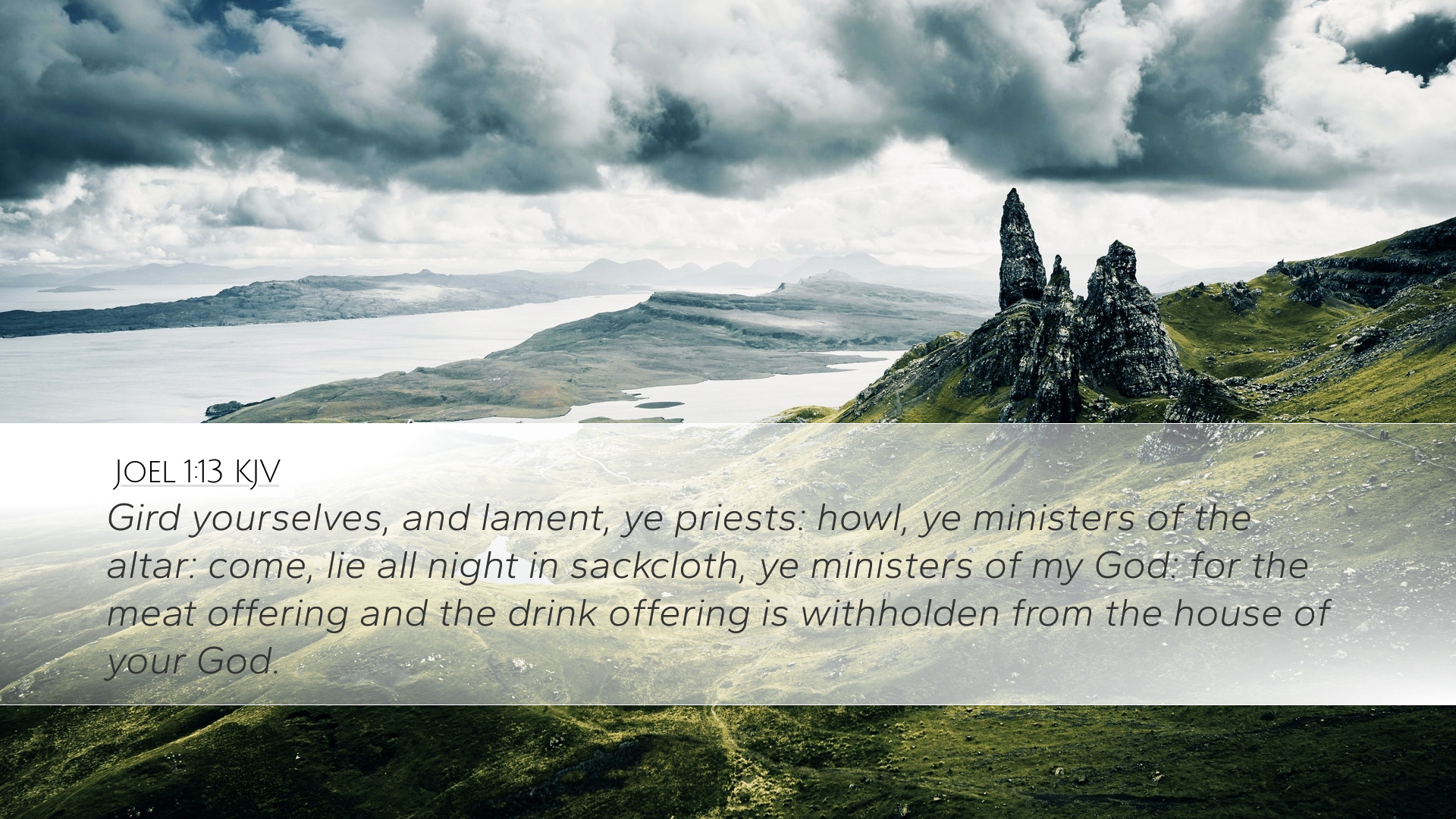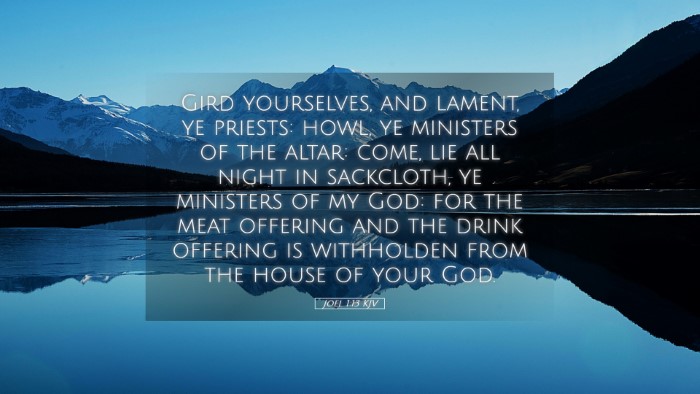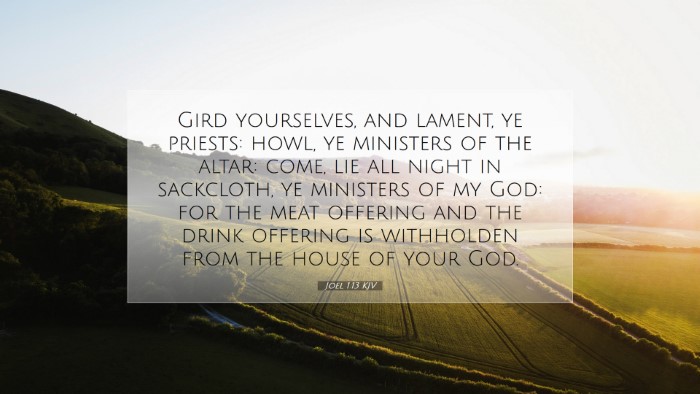Old Testament
Genesis Exodus Leviticus Numbers Deuteronomy Joshua Judges Ruth 1 Samuel 2 Samuel 1 Kings 2 Kings 1 Chronicles 2 Chronicles Ezra Nehemiah Esther Job Psalms Proverbs Ecclesiastes Song of Solomon Isaiah Jeremiah Lamentations Ezekiel Daniel Hosea Joel Amos Obadiah Jonah Micah Nahum Habakkuk Zephaniah Haggai Zechariah MalachiJoel 1:13
Joel 1:13 KJV
Gird yourselves, and lament, ye priests: howl, ye ministers of the altar: come, lie all night in sackcloth, ye ministers of my God: for the meat offering and the drink offering is withholden from the house of your God.
Joel 1:13 Bible Commentary
Commentary on Joel 1:13
Joel 1:13 presents a powerful moment in the prophetic literature of the Old Testament, capturing the urgency and gravity of a call for repentance in the face of devastation. This commentary synthesizes insights from public domain sources including Matthew Henry, Albert Barnes, and Adam Clarke to provide a meaningful exploration of this scripture.
Contextual Overview
The Book of Joel, part of the Twelve Minor Prophets, addresses the spiritual and agricultural crisis following a severe locust plague which has devastated the land. In this context, Joel calls upon the priests and the people to mourn and repent, recognizing the Lord's hand in their suffering.
Verse Analysis
In Joel 1:13, we find:
"Gird yourselves and lament, you priests; wail, you who minister before the altar; come, lie all night in sackcloth, you who minister to my God; for the grain offering and the drink offering are withheld from the house of your God."
Key Themes
- The Role of the Priests: Joel's instruction to the priests emphasizes their critical role in guiding the people back to God. As mediators between God and the congregation, their mourning is a public signal of repentance.
- The Call for Mourning: The act of girding themselves and wearing sackcloth symbolizes deep sorrow and humility before God. This external act reflects an inward condition of remorse and the recognition of sin.
- The withhold of offerings: The cessation of grain and drink offerings denotes a broken fellowship with God. It highlights the consequences of sin, where worship is stifled due to divine displeasure.
Commentary Insights
Matthew Henry's Commentary
Matthew Henry emphasizes the seriousness of sin and the lethargy that can envelop God’s people in times of crisis. He notes that the priests are to take the lead in expressing grief, understanding that their spiritual state reflects the spiritual condition of the entire nation. Henry suggests that this call to lament is not merely for show but is meant to foster genuine contrition and a desire for restoration.
Albert Barnes' Notes
Albert Barnes reflects on the significance of the priestly calls to mourning and what this implies for worship. He outlines how the prohibition of offerings signifies a withdrawal of God's blessing and how essential it is for the priests to actively engage in repentance through their own lamentation. Barnes provides insight into how this call serves to awaken the collective consciousness of the people towards their transient state and their need for God's mercy.
Adam Clarke's Commentary
Adam Clarke discusses the specifics of the lamentation that Joel calls for and the broader implications of their condition. He notes that the orders to "lie all night in sackcloth" signifies an extreme and earnest effort to seek God’s favor. Clarke also addresses the cultural significance of sackcloth and ashes as traditional symbols of mourning, anchoring them in biblical practices that demonstrate a serious approach to seeking forgiveness from God.
Implications for Today
The message contained in Joel 1:13 is timeless and extends to today’s believers in several crucial ways:
- Leaders and their Responsibilities: Just as the priests were to lead the way in mourning, church leaders today are called to demonstrate humility and sincerity in times of moral and spiritual crisis within their congregations.
- Corporate Repentance: This call to lament invites the entire community to recognize their collective need for repentance, reinforcing that individual and corporate sins can lead to a withdrawal from God’s presence and blessings.
- Understanding Worship's Connection to Holiness: The withholding of offerings illustrates that our worship can be hindered by sin. Believers are urged to examine their hearts, repent, and restore their relationship with God to ensure that their offerings are received.
Conclusion
Joel 1:13 serves as a powerful invitation to reflect on the nature of our relationship with God and the communal aspects of our faith. By engaging in collective mourning and repentance, we respond to the challenges and crises of our own time. The insights from these commentaries not only enrich our understanding of the text but also challenge us to walk in sincerity before our God.


